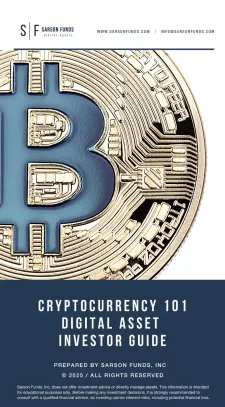
Congratulations—you’ve made it down the Bitcoin rabbit hole, and now you’re asking the tougher questions. If Bitcoin is the ultimate digital store of value, then what are all these other cryptocurrencies up to? What is Ethereum, how does it differ from Bitcoin, and why are prominent investors suddenly talking about it? Perhaps you’ve seen Ethereum’s (ETH’s) impressive price appreciation and are curious about future price movement. In this article, we will uncover Ethereum’s present use cases, recent price appreciation, and remaining upside potential.
Native to the Ethereum network, Ether (ETH) is a cryptocurrency like Bitcoin. However, Bitcoin’s value is commonly understood as a function of its adoption as a decentralized and deflationary store of value. In contrast, Ether’s value is derived from user demand for smart contract execution on the Ethereum network. In essence, smart contracts execute decentralized applications (dApps) automatically, creating value in part by eliminating the need for central authority. Because Ethereum’s bandwidth is limited, users pay transaction fees with Ether to incentivize miners (network transaction validators) to process smart contract execution. Since anyone can create a dApp, the Ethereum network has become a vibrant and competitive ecosystem for technological innovation. With promising opportunities to decentralize and automate (read: disrupt) some of the world’s most valuable markets in finance, logistics, real estate, and more, exposure to Ethereum and its dApps may be a critical component to the modern investor’s successful portfolio.
So, what dApps exist today that contribute to Ethereum’s soaring values? Lending protocols such as Aave (AAVE) and Compound (COMP) enable users to earn interest or borrow crypto instantly. Synthetix (SNX) enables users to issue and trade synthetic assets that track the price of external assets, such as US dollars or exchange-traded stocks, making derivatives more accessible and liquid. Decentralized exchange (DEX) protocols like Uniswap (UNI) facilitate automated trading of Ethereum tokens through liquidity pools, allowing users to maintain custody of their assets as opposed to being held by centralized exchanges. Though these are only several examples, these rapidly growing dApps demonstrate real adoption and represent a broader wave of change which echoes Bitcoin’s ethos of decentralization: the decentralization of finance, or “DeFi.” Observing this trend begs the question: How much higher can ETH’s valuation go?
At the time of writing, Ethereum’s market cap is hovering around $200B USD; one year ago, today, that figure was $13B. Still, Ethereum accounts for only a miniscule share of wealth when compared to the stock markets. Globally, stock markets have an estimated value approaching $90T. But the financial markets don’t end there. Low-end estimates of global derivatives markets are $560 trillion. High-end estimates reach as high as $1.2 quadrillion. Considering the recent advent of dApps like Synthetix, it seems that Ethereum may just be getting started tapping into these markets.
When faced with Ethereum’s exploding levels of innovation and adoption, it is easy to get carried away with such numbers. In truth, nobody can precisely predict the extent to which Blockchains such as Ethereum will continue to replace legacy financial systems. Nevertheless, it is crucial to understand the enormity of Ethereum’s upside potential and consider the risk of not being exposed to its growth. At Sarson Funds, we believe the trend of decentralization will continue to manifest itself through Ethereum and other blockchain-based technologies like DeFi. For education and news updates on other emerging cryptocurrency sectors like NFTs, DAOs, stablecoins, internet-of-things, data sovereignty, and more, follow us on Twitter, LinkedIn, and check out our newsroom.
By Nathan Frankovitz
Disclosures: Not investment advice. It should be assumed that Sarson Funds or its affiliated managers hold positions in all projects that are discussed. It is not possible to invest in any project directly through Sarson Funds, Inc. or its affiliated managers. Any investment product offered by managers affiliated with Sarson Funds should be assumed to be only available to Accredited Investors and subject to the individual terms and conditions of that offering including but not limited to those eligibility requirements associated with U.S. Securities Regulation D, section 506c. Talk with your financial advisor before making any investment decisions or have them contact Sarson Funds directly at [email protected]








